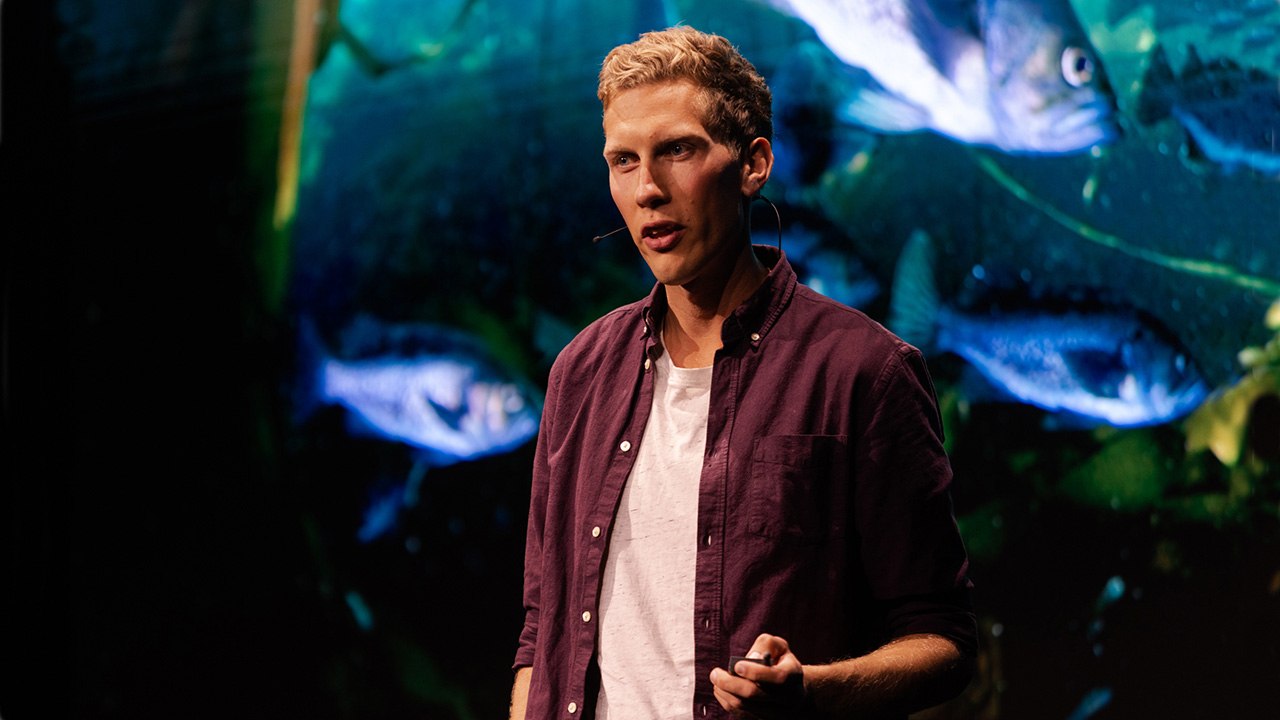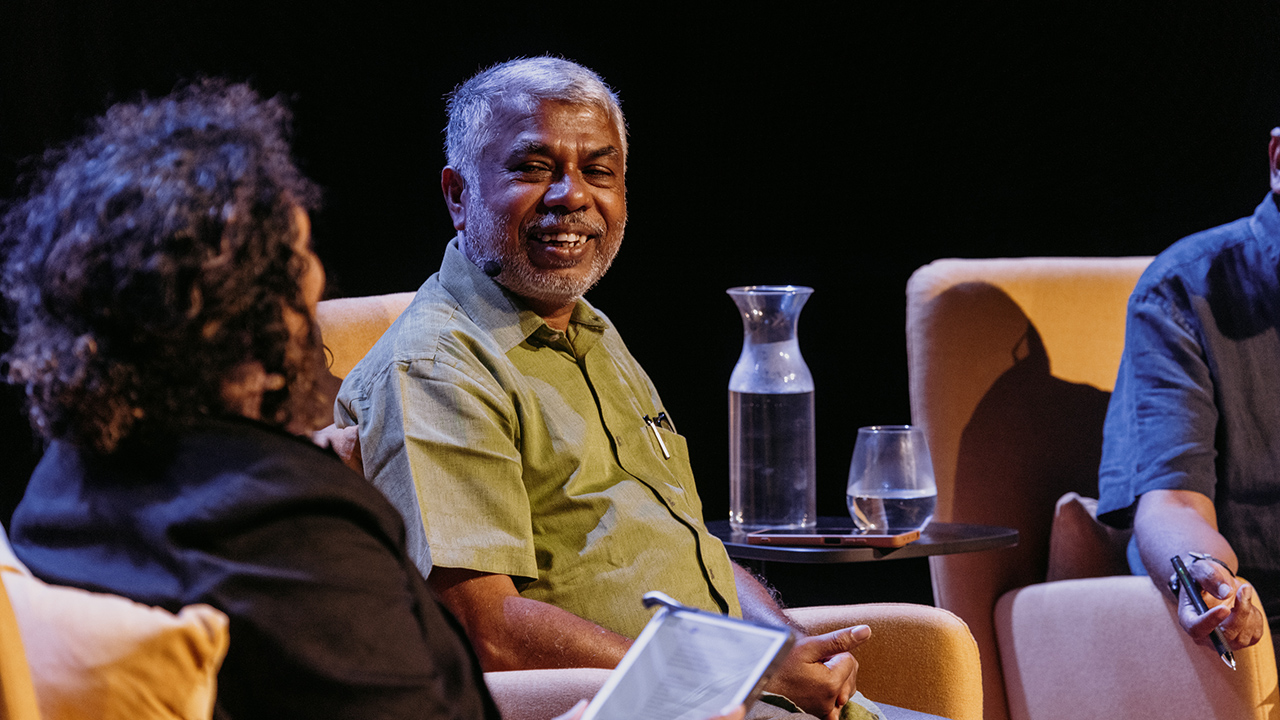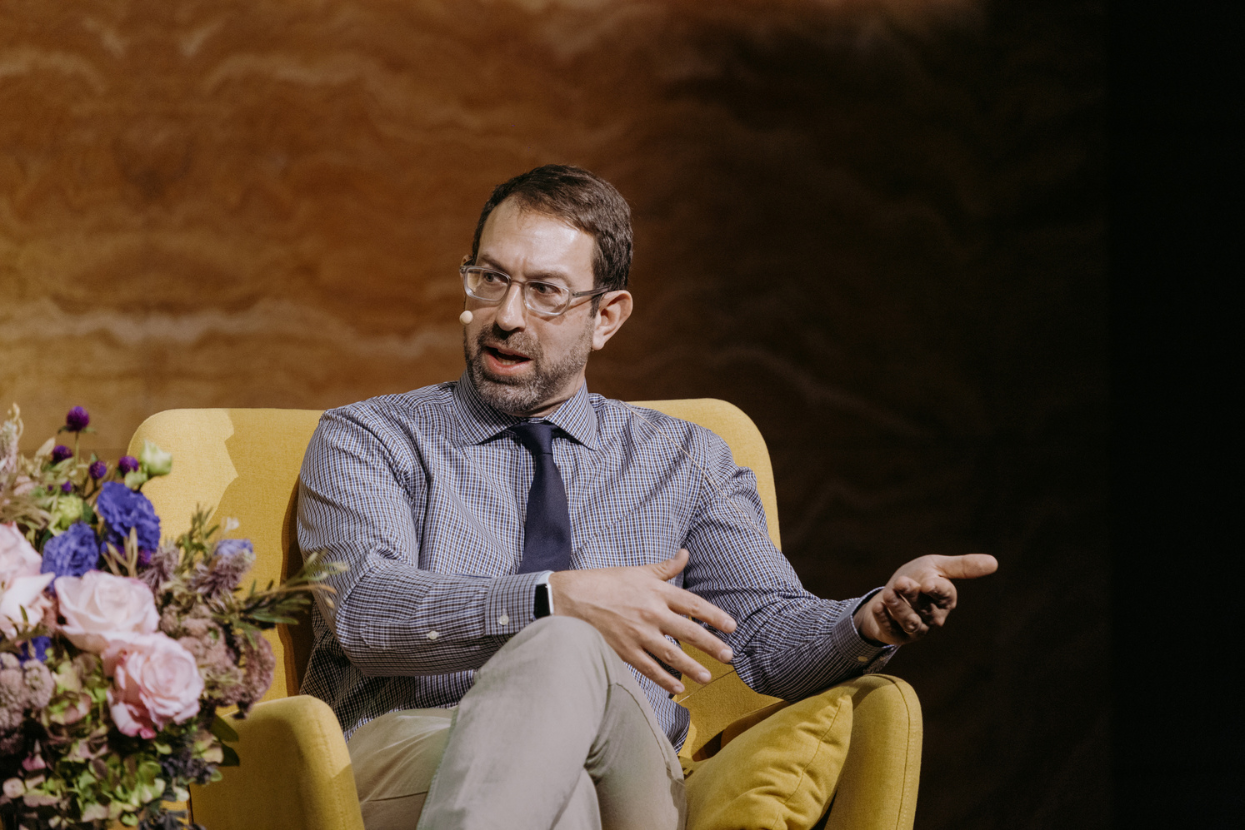Aaron Eger | Can playing God save our seas?

The consequence of our inaction is too great for our society… [we must] turn our godlike ability to destroy, into an ability to create.
For years, western conservation work has thought the best way to save our seas was to remove people from the equation. This can make sense, as humans have had a profoundly negative impact on our seas and, in some cases, removing the cause of the problem is enough to generate a solution.
But the oceans are now struggling to sustain themselves and we have pushed ecosystems too far for them to recover on their own. We need to acknowledge that we have been part of the problem, but that we can also be part of the solution.
Time is fast running out. Can we turn our godlike ability to destroy, into an ability to create and restore our oceans?
This talk was a part of Fresh Blood, an event of short talks in the 2022 Festival of Dangerous Ideas.
Transcript
UNSW Centre for Ideas: Welcome to the UNSW Centre for Ideas podcast. A place to hear ideas from the world's leading thinkers and UNSW Sydney’s brightest minds. The talk you are about to hear, Can playing God save our seas?, features UNSW Sydney PhD candidate Aaron Eger, and was recorded live. This talk was a part of ‘Fresh Blood’, an event of short talks in the 2022 Festival of Dangerous Ideas.
Aaron Eger: Our oceans are home to an unimaginable abundance and variety of life. And for thousands of years, that abundance was so unimaginably large, that we thought the only way that it might disappear was by an act of God. Surely, us mere mortals could do nothing to harm the teeming throes of life in the sea. But as with all tragedies, the unimaginable is only unimaginable until it is not. And well, a lot has changed in the last few hundred years, many things have really stayed the same. Back then was actually whale oil, not fossil fuel that supported our society. And we were hooked on it. Whaling ships would scour the ocean, sometimes for years at a time, hoping to fill up on sperm whales, blue whales, and humpbacks to meet this demand. These hunts were the beginning of the end to the idea that people could do no harm to the sea, even with something as big as a whale.
By the 1960s, the whale population had plummeted to only 5,000 humpbacks across the globe. But thankfully, this particular story has a happy ending. See, us mortals took notice, fought for change, and placed a moratorium on whaling, mostly banning the practice. As a result, there are now about 180,000 humpback whales across the globe. In this story, people's drive for whale-based energy had a godlike impact on the whale population. But once people were aware of the problem, they changed their actions and the whale population trended back towards its natural state of abundance. And this is a great story. Actually, it's one of the greatest conservation wins of the 20th and 21st centuries. But there's a reason that conservationists love this story so much. It's because it's actually quite rare. See, it's one of the very few examples that we have where simply taking our finger off the scales has allowed nature to recover on its own.
Let me tell you another story. When I was a wee bit smaller, I would go out boating with my grandfather, just off the west coast of Canada. We would load up the little aluminium boat, roll down our barnacle encrusted boat ramp, and head off in search of another kind of marine mammal, the Orca. And whether we had blue skies, or more commonly grey ones, we had a pretty good chance of spotting the pod of orcas and their towering dorsal fins slicing through the emerald Canadian seas. Once we were off the dock, there wasn't a lot that we could run into on the ocean, very few lamp posts or mailboxes out at sea. So from time to time, littler and younger me was allowed to captain the ship. That was until I steered near a forest, because once that happened, my captain's hat was taken away. Because if I steered into that, our engine would go dead, and we would be bobbing until we could set ourselves free. Now for the non-neurotically minded in the room, you might have hit just a little bit of a discord. One moment we were on the ocean in a boat, but I was at risk of driving into a forest? Well, as outlandish as that might seem, that's exactly right. Beneath the waves of our colder seas, they have seaweeds known as kelp. And a lot like the forest on land, these marine marvels provide the thread for a rich tapestry of life.
But instead of birds, flowers and frogs, you get kelp, cod and creatures with three hearts or ten legs. And have you ever gone for a walk in the forest, come back the next day and the trees are about a foot taller? Probably not. But with kelp forests, you can go snorkelling one day, return the next and the swirling branches of green, orange and brown have grown by about the length of your arm. This incredible productivity also means that these branches are filled with animals of all varieties, from the smallest snail, all the way up to the orcas that we so desperately wanted to see. And as these colours mix and furl back and forth, he might spot a sea otter waving hello, or a rock lobster scuttling over a prized abalone. Hundreds of millions of people depend on kelp forests. They provide food and fisheries, produce oxygen, remove pollution, draw down carbon, and our cherished spots for scuba divers, snorkelers, and the ocean minded alike.
Let's head back to that same spot in Canada. These days, my captaining would be a lot more worry free. I no longer have to worry about getting my boat stuck. There simply isn't a kelp forest there anymore. And if I'd grown up in Tassie, I'd have a very similar story to tell. Over the last few decades alone, Tasmania has lost over 95% of its kelp forest, unlike on land, no one is cutting these forests down. Instead, we're seeing just how godlike human activity can be. Through a twisted dance of addition and removal, we are reshaping the very fabric of our oceans. As we add carbon dioxide to the atmosphere, we continue to push the thermometer up, making the seawater too warm for kelp to survive. Our continued demand for seafood is eliminating top predators like otters, lobsters, and those really big hungry fish. Normally, these animals would eat and help control the populations of herbivores such as sea urchins, which can graze entire kelp forests. And all across the globe, we pump nutrients, sediment and pollution into our coastal seas. The results are truly devastating. Kelp forests have declined or disappeared on every continent. And unfortunately, this isn't like the whales, we have taken notice. And we've tried slowing down pollution, or easing our harvest of sea otters and other predators. But in most cases, this just doesn't seem to be enough. We're not seeing the return the kelp forests once we've taken our finger off the scale.
So what are we to do? Do we leave the ocean to rebuild the house after we've burnt it down? I would argue that doing nothing is a dereliction of duty, both to nature and to ourselves. We simply bear too much responsibility, and the consequences for our societies are too great to even consider not trying to turn our Godlike ability to destroy, into an ability to create. Though, just as I think this inaction is unthinkable, many people may think that playing God, intervening in the natural world is either impossible, unthinkable or both. And let's face it, we have a pretty poor track record when it comes to introducing plants and animals into an ecosystem. Ecological Australia itself has repeatedly borne the brunt of these manipulations, and the weight of our finger on the scale has been far too heavy. From unintended invasions and damages due to cane toads, camels or rabbits, the consequences have been equally devastating. So I can see why people might be hesitant to play God with nature. But these projects were different. They were done to only benefit humans.
For me, part of the solution comes from recasting what it means to play God. What some people might consider playing God, I would cast as an act of tending, nurturing our responsibility. We can choose to continue to view ourselves as trembling tyrants, strong arming the environment for our own benefits. Or we can accept that we have the ability to make a profound impact on nature. And it's time that we use that power for good.
Back beneath the waves, what does this all look like in practice? Well, in Korea, we have a term that roughly translates to marine gardening. And I think this is the philosophy that we need to adopt. We accept that there is a two-way relationship.
People are not separate from nature. People may take from the sea, but people can also take care of the sea. And this analogy extends beautifully to kelp forests. Because the ways we can save our kelps really are a lot like the ways we work in our gardens. We can till the soil by making it easier for kelp to grow on the seafloor. We can distribute seeds into the ocean and hope that they take root. Or we can grow plants in a nursery and transplant them fully grown into the sea. If the waters are now too warm, we can select and breed heat tolerant species and individuals to add back into the ocean. And this underwater gardening also has its share of pests. You know those caterpillars that chew on your tomatoes? Well kelps have the same problem, and they are munched on by the previously mentioned herbivore known as the sea urchin. So, as we remove the caterpillars, we remove the urchins. And in the same way, you might keep some chickens around to pick off these pests. We can add back missing pieces of the ecosystem such as sea otters, lobsters, or those really hungry fish. These animals naturally prey upon the urchins and help the kelp forests thrive. And most importantly, this can all happen now. We have now started to see kelp forests restoration projects all across the globe. And for good reason. Playing God, gardening, stewardship these ideas are not new. Many countries and cultures have practiced them for millennia. But we now need this idea to be the norm and not the exception.
That is why we're launching the Kelp Forest Alliance, a global collaboration that calls for societies, governments and organisations to embrace our mutual relationship with and responsibility for the sea. We're challenging our societies to rein in that godlike ability to destroy the environment and harness our ability to create and culture life. If we are successful, we can restore the oceans to the once unimaginable homes of biodiversity and abundance that they weren't in the past.
UNSW Centre for Ideas: Thanks for listening. This talk was presented by the UNSW Centre for Ideas and Festival of Dangerous Ideas. For more information visit centreforideas.com, and don't forget to subscribe wherever you get your podcasts.
-
1/3
-
2/3
-
3/3

Aaron Eger
Aaron Eger is a PhD candidate in the School of Biological, Earth, and Environmental Sciences, Faculty of Science at UNSW Sydney. His work spans marine ecology, economics, science communication and kelp forest conservation. Aaron’s research has resulted in the first ever kelp restoration guidebook, global analysis of the value of kelp forests, and the first global review of kelp forest restoration across 300 years of practice. He is also the Founder and Program Director of the Kelp Forest Alliance, a global community of practice and a freely available global database on restoration projects where people can upload new information about their own projects.



